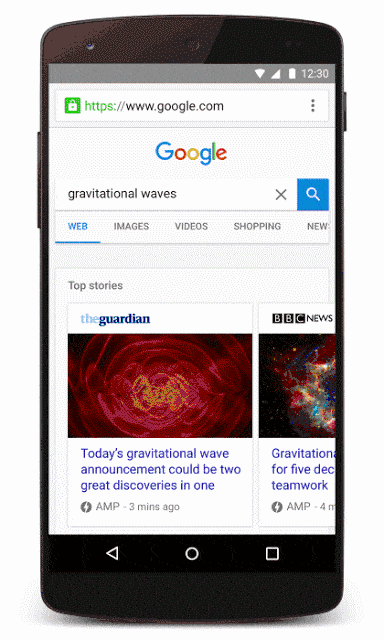
“Eternal Vigilance!” is the name of the game.
Keep a sharp watch for strategy shifts by key competitors and sudden upheavals in the marketing landscape while always refining your winning value proposition ‒ those are the watchwords for every successful marketer.
And in case Eternal Vigilance isn’t your motto, Google is throwing two big changes at you to make sure you are awake: First, Google is making big revisions in the display of organic and paid search results. Second, Google is working overtime to speed mobile delivery of news and magazine content.
Google Disrupts: The Display of Search Results
First and foremost, Google is altering the all-important page one of search results. The search engine giant has deleted the right-hand display of ads on page one and instead posted an additional paid search result at the top of the page. The result: often the top four positions on page one are purchased, while organic search results have been pushed down the page. No matter how great your SEO enhancement, your website could always appear below the fold or worse.
Why did Google shake up its page one display? Kevin Gibbons over at Search Engine Watch offers his insights: “The obvious answer is revenue and I’m sure that is a big factor. But I think it’s likely to be a balance between revenue and a more modern search experience that reflects mobile [layout] vs. desktop. Ultimately changes like this have to be beneficial to the search experience, otherwise Google ends up chasing short-term revenue instead of long-term market share.”
Every digital marketer knows that SEO rules the World Wide Web, driving tons of business into your sticky web pages. Now, however, the results of SEO have shifted. Fewer spots are available on the first page of organic search in cases of a “commercial search,” as specified by Google.
And page one is critical prime real estate.
According to Moz, 71.33% of searches result in a page-one organic click. After that, the click-through rate drops fast. “Page two and three get a mere 5.59% of the clicks. On the first page alone, the first 5 results account for 67.60% of all the clicks and the results from 6 to 10 account for only 3.73%.”
The competition is sure to heat up for top organic search ranking. And that, says Google, is all the more reason to be mobile friendly. In the heated fight for page-one rankings, you can’t afford to drive customers away with bad experiences on their phones or tablets. Moreover, Google’s search algorithm elevates websites that meet their criteria for “mobile friendliness.”
How do you rank in terms of mobile friendliness? With Mobilizer’s easy online mobile testing lab, there’s no reason to be in the dark on your mobile performance, nor to lose any revenue from mobile traffic. Enter your URL and see how your website renders on real market-leading phones and tablets – all displayed side-by-side for easy inspection within 35 seconds.
Open-Source AMP Speeds Up Mobile
Google isn’t resting content with just rewarding businesses that improve mobile experience with responsive web design and other innovations. It’s also stepping up to the plate and combatting a leading consumer complaint: slow mobile loading time.
 Yes, wait time on the web is critical. KissMetrics tells us: 40% of shoppers abandon a site if their wait exceeds three seconds, and each additional second of loading time results in a 7% reduction in conversions.
Yes, wait time on the web is critical. KissMetrics tells us: 40% of shoppers abandon a site if their wait exceeds three seconds, and each additional second of loading time results in a 7% reduction in conversions.
Google is spearheading an open-source project to speed mobile page delivery. Called AMP (accelerated mobile pages), the project includes many of the biggest and brightest minds in the news and tech world.
Now AMP is generating stunning enhancements. First rolled out two weeks ago, AMP-modified pages for such publishers as the Washington Post or Germany’s Die Zeit will “load blazingly fast,” says Google. Helping the press stay relevant, Google says AMP stories will appear in the Top Stories section of the search results page. A mere click and you will be immediately scrolling through a news report or jumping to the next AMP-enhanced article. Given AMP stories’ elevated ranking in Google search, The SEO experts at Yoast recommend: “If you run a news site or a blog, you need to make sure your site supports AMP. It’s as simple as that.”
No one doubts the worldwide web has revolutionized marketing and, indeed, all selling, whether B2B or B2C. But more, the Internet and behemoths like Google have made turmoil and change a permanent part of the marketing landscape, necessitating that all marketing teams stay agile and Eternally Vigilant!
- Google’s AMP: Enemy or Ally to Your Mobile Friendly Website? - January 29, 2018
- Mobile Marketing: Optimize the Mobile Customer Journey - January 29, 2018
- Mobile Load Time: Increasing Mobile Page Speed to Improve Mobile Conversion - January 22, 2018
